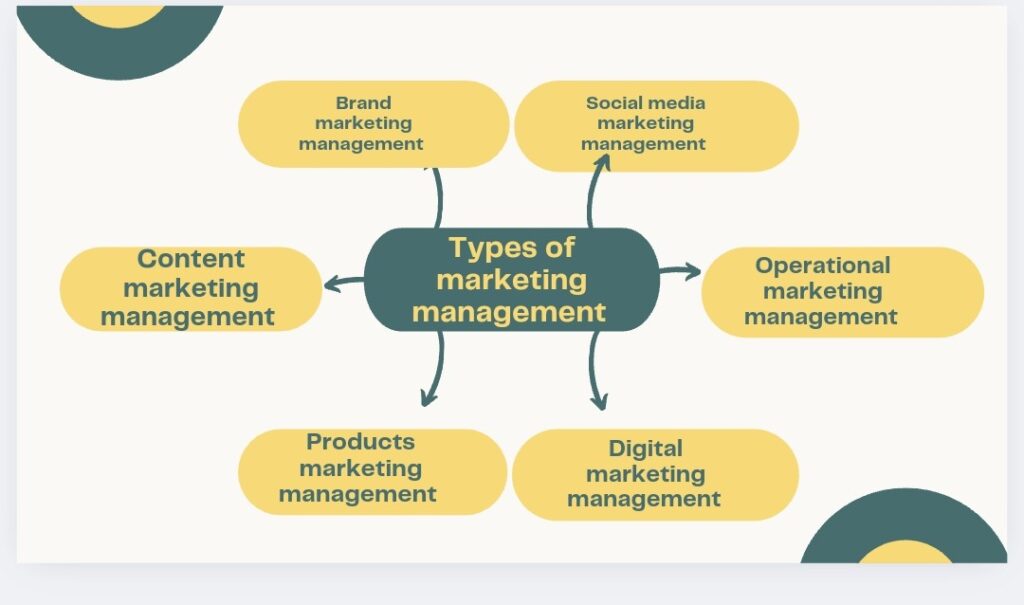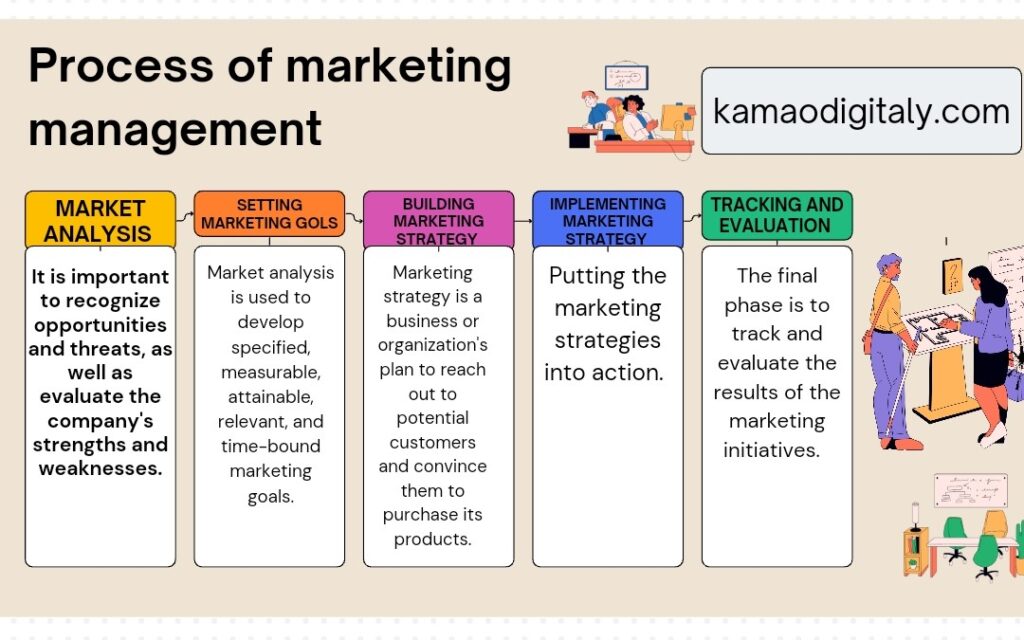
Did you want to be expert in marketing management and you want to become a marketing manager.Let’s began with this blog to know every single detail of marketing management.
What is marketing management ?

Marketing management is the process of creating, managing, executing, and controlling marketing strategies, programs, and activities to achieve business goals by fulfilling customer needs.
Marketing management is thestrategic and planned creation and execution of an organization’s campaigns.
Marketing management involves determining the target market, researching customer behavior, creating promotional plans, establishing competitive pricing, managing distribution networks, and monitoring performance using various marketing indicators.
As a marketing manager, you will assist organizations in developing and implementing marketing strategies.
Marketing management is a complex field that needs creativity, analytical abilities, strategic thinking, and good communication. It involves creating a marketing strategy, setting objectives, assigning money, and tracking the effectiveness of marketing efforts.
People in marketing management serve as intermediaries between a firm and its target consumer.Marketing management is important in allowing businesses to create targeted marketing activities and measure results in order to obtain new customers and maintain existing ones.
The main objectives of marketing management
Marketing management has various objectives. The top 7 marketing management objectives are mentioned below.

1.Identify and Understand Customer Demand
Finding and understanding consumer demands and desires is one of the main objective for marketing management.
It involves finding out what customers want and need from a product or service in order to ensure it is relevant, valuable, and satisfies their expectations. This understanding influences product development, marketing techniques, and, finally, consumer happiness.
Methods to Identity Customers Demand
- Market research
- Observing to Social Media
- Keyword research
- Customer feedback
- Competitor analysis
2.Demand Creation
Demand creation is second strategic objective in marketing management that focuses on proactively generating interest and awareness for a product or service, particularly among potential consumers who are not yet actively looking for solutions.
It is about educating the market, molding perceptions, and positioning a product as the best answer to a problem, which will eventually lead to a stronger sales pipeline.
3.Identifying The Right Price, Location
To Identify best price and location for marketing management, organizations must deeply investigate their target audience, understand their capacity to pay, compare competitor pricing, and select the most successful distribution channels.
This involves matching the price to the perceived value of the product and determining the areas (physical or digital) where the target audience is most likely to engage.
4.Build a Strong Brand
Building a strong brand is a very important objective of marketing management for developing a positive brand image and reputation. This includes creating a consistent brand identity, communicating brand values, and increasing customer loyalty.
5.Costumers Satisfaction
Customers are at the foundation of every organization, and marketing is customer-focused. It starts before production and continues even after the product is sold to monitor client reactions.
Every marketing manager need to find to provide the highest degree of client satisfaction possible. consumer happiness is dependent on delivering the appropriate product to the right consumer at the right time and place. Further, customer happiness plays an important role in the long run because a company’s survival depends on its ability to satisfy its customers.
6.Profitabilty
Profits are important for the success of any business.A company must generate profits on a regular basis because this affects the bottom line of the business. Effective marketing management improves business profitability by creating demand and increasing market share.
7.Market Share Growth
Market share is the percentage of customers a company has among all customers in the sector.A company’s success is determined by the percentage of market share it has gained over its competitors.
In this comparable market, every A company’s success is determined by the percentage of market share it has gained over its competitors.company competes with others to grow its market share by drawing clients and thereby raising revenues.
This is achieved through efficient marketing. Apart from that, some of the measures that must be performed to increase market share include better customer service, attractive advertisements, increased promotional activities, consumer-friendly rates, and so on.
Why Marketing Management is Important in Business ?
People in marketing management serve as intermediaries between a firm and its target consumer.Marketing management is important in allowing businesses to create targeted marketing activities and measure results in order to obtain new customers and maintain existing ones.

Marketing management specialists collaborate with businesses to connect goals with marketing efforts, and they use metrics and other tools to modify as needed.
- Marketing management enables businesses to understand consumer demands, find new opportunities, and create value through carefully planned strategies.
- Well-executed marketing initiatives attract and convert leads into consumers,hence increasing revenue.
- Furthermore, marketing management enables optimal resource allocation, optimization of marketing budgets, and performance measurement for absolute return on investment.
- Marketing management enables agility, allowing businesses to adapt to evolving market landscapes, technological advancements, and consumer preferences.
- Innovative value propositions, positioning strategies, and successful branding differentiate organizations from competitors,ensuring a long-term competitive advantage.
Types of marketing management
There are many types of marketing management. Here, we are going to discuss 6 most important types of marketing management. So let’s begin with us .

1.Social Media Marketing Management
Social media marketing management is the activity of actively managing and optimizing a brand’s presence on multiple social media channels.
It include developing, scheduling, and releasing content, engaging with audiences, assessing performance, and promoting social media activities with the company’s larger goals.
This encompasses content development, community management, social listening, and reporting on key performance indicators.
2.Digital Marketing Management
Digital marketing management is the process of managing and implementing a company’s digital marketing strategy in order to promote products or services and achieve business goals.
It includes a variety of online channels including as websites, social media, search engines, and email, which use digital technologies to engage customers and increase sales.
A digital marketing manager creates, executes, and monitors campaigns, analyzes performance, and modifies data-driven strategies to increase visibility and lead generation.
3.Product Marketing Management
Product marketing management is responsible for bringing products to market and ensuring their success.
It includes techniques and strategies for increasing popularity of products, managing the product lifecycle, and connecting product positioning with consumer needs. This includes identifying target audiences, creating messaging, developing go-to-market strategies, and empowering sales and marketing personnel.
4.Brand Marketing Management
Brand marketing management is a strategic marketing strategy that focuses on developing and maintaining a brand’s image and reputation in order to boost perceived value and drive financial success. It involves a variety of tasks, including designing brand identity, managing communications, tracking performance, and developing emotional relationships with customers.
5.Content Marketing Management
Content marketing management is the strategic process of planning, developing, distributing, and analyzing information to engage a target audience and meet company goals.It involves handling all parts of content development, from inspiration to publication, as well as analyzing its effectiveness.
6.Operational Marketing Management
Marketing focuses on meeting consumer wants and creating demand, whereas operations management manages the processes and resources required to deliver products or services efficiently.Effective collaboration between these two areas is critical to a company’s success, especially in new product development and customer pleasure.
Process of marketing management
The process of marketing management is given below.

- Market analysis means understanding the market, including customers, competitors, and the broader business environment. It is important to recognize opportunities and threats, as well as evaluate the company’s strengths and weaknesses.
- Setting marketing goals ,Market analysis is used to develop specified, measurable, attainable, relevant, and time-bound marketing goals.
- Building marketing strategy ,marketing strategy is a business or organization’s plan to reach out to potential customers and convince them to purchase its products.
- Implementing marketing strategy ,Putting the marketing strategies into action. Product creation, pricing, distribution, advertising, and sales promotion are some of the operations covered.
- Tracking and evaluation,The final phase is to track and evaluate the results of the marketing initiatives. This allows for any necessary changes and upgrades to the marketing plan and initiatives.
Challenges in marketing management.
In marketing management marketing managers face a variety of issues, including lead generation, audience targeting, budget limits, client retention, and adjusting to rapid technological advances. Other key challenges include analysing client journeys, maintaining data properly, and entering new markets.
